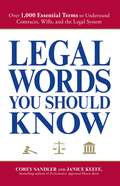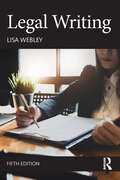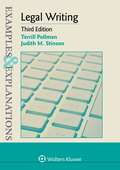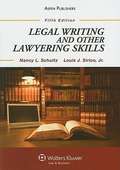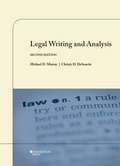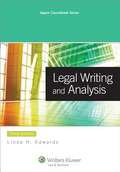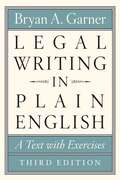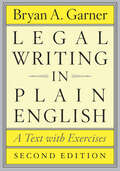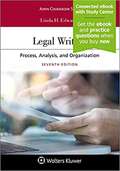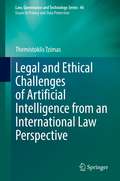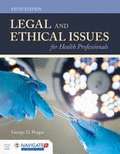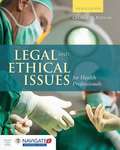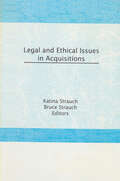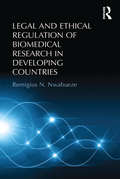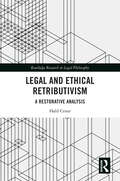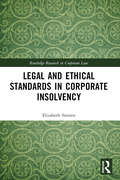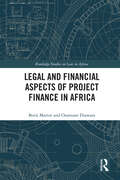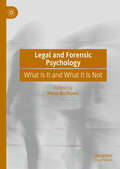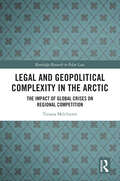- Table View
- List View
Legal Words You Should Know: Over 1,000 Essential Terms to Understand Contracts, Wills, and the Legal System
by Corey Sandler Janice KeefeEvery day, people find themselves in legal situations. Mortgages are put in place, attorneys draw up wills, and credit cards are set up all the time. However, how many people actually understood the legal contracts they were signing? There's no excuse for being ignorant of the law when it comes to a dispute with a bank, a mortgage lender, or a lawyer. This book defines 1,000 essential words from the worlds of civil law, estates, lending, and elder affairs, such as abatement, residuary beneficiary, trust deed, variable rate mortgage, right of rescission, and more. Each word will be clearly defined, and includes a pronunciation key and an example of usage. This guide ensures you will know the law in no time!
Legal Writing
by Lisa WebleyLegal Writing guides students comprehensively through this vital legal skill and addresses a range of assessment methods from exam questions to final essays and problem answers. It considers how to deconstruct essay and problem questions and how to conduct and apply legal research to answer set questions. Lisa Webley explains how to reference others' work clearly and correctly, making this book a useful tool for students concerned about issues of plagiarism. It also focuses on how to develop critical thinking and communicate legal arguments, with both good and bad examples of written work considered and discussed in the text. Legal Writing is particularly useful for undergraduate students, especially at the beginning of degree studies, and for GDL and CPE students too. This fully revised fourth edition includes: Guidance on the avoidance of plagiarism including examples of poor practice and best practice. Worked examples throughout the text, including guidance on deciphering essay questions in exams and coursework, along with additional examples from across the legal curriculum on the companion website. An improved companion website with increased guidance for revision to allow students to test their progress and further engage with the topics in the book. Clearly written and easy to use, Legal Writing enables students to fully engage with essay and exam writing as a vital foundation to their undergraduate degree.
Legal Writing
by Lisa WebleyLegal Writing guides students comprehensively through this vital legal skill and addresses a range of assessment methods from exam questions to final essays and problem answers. It considers how to deconstruct essay and problem questions and how to conduct and apply legal research to answer set questions. Lisa Webley explains how to reference others’ work clearly and correctly, making this book a useful tool for students concerned about issues of plagiarism. Legal Writing also focuses on how to develop critical thinking and communicate legal arguments, with both good and bad examples of written work considered and discussed in the text. Legal Writing is particularly useful for undergraduate students, especially at the beginning of degree studies, as well as for those preparing for the SQE exams. This fully revised fifth edition includes: Guidance on how to avoid plagiarism, including examples of the best and worst practices Worked examples throughout the text, including how to decipher essay questions in exams and coursework An expanded set of accompanying digital learning resources with increased guidance for revision to allow students to test their progress and further engage with the topics in the book. Clearly written and easy to use, Legal Writing enables students to fully engage with essay and exam writing as a vital foundation to their undergraduate degree.
Legal Writing (2nd Edition)
by Sheila J. Simon Richard K. Neumann Jr.Written for law students, this well-organized and thorough book shows how to hone legal writing skills in real-world situations. Topics include process, style, memoranda writing, organizing analysis (CREAC), analytical writing, persuasive writing, telling a client's story, making the client's argument, appellate briefs, and oral argument. Each chapter includes exercises. Appendices contain sample memos and briefs. An accompanying access code protected website offers supplementary material including videos, checklists, and articles. Annotation ©2011 Book News, Inc. , Portland, OR (booknews. com)
Legal Writing (Examples and Explanations)
by Terrill Pollman; Judith M. StinsonA favorite classroom prep tool of successful students that is often recommended by professors, the Examples & Explanations (E&E) series provides an alternative perspective to help you understand your casebook and in-class lectures. Each E&E offers hypothetical questions complemented by detailed explanations that allow you to test your knowledge of the topics in your courses and compare your own analysis.
Legal Writing And Analysis (Aspen Coursebook)
by Linda Holdeman EdwardsThis streamlined text offers a straightforward guide to developing legal writing and analysis skills for beginning legal writers. Legal Writing and Analysis, Fifth Edition by Linda Edwards, leads students logically through reading and analyzing the law, writing the discussion of a legal question, and writing office memos, letters, and briefs. The text includes chapters on citation form, writing style, professionalism, and oral argument. <P><P> The book features special focus on forms of legal reasoning (rules, analogies, policies, principles, customs, inferences, and narrative) complete with examples and exercises. It teaches students to recognize rule structures and use them to organize their document. <P><P> New to the Fifth Edition: Streamlined chapters and exercises Updated citation materials covering current editions of both citation manuals Product page featuring more material on professional letters and accessible coverage and use of legal theory <P><P>Professors and students will benefit from: Contextual learning, including important legal method material Superior treatment of how to organize a legal discussion Clear, ample coverage of legal reasoning Practice-oriented approach Numerous examples and short exercises for formative assessment Strong coverage of professional responsibility
Legal Writing And Other Lawyering Skills, 5e
by Nancy L. Schultz Louis J. Sirico Jr.With a consistent emphasis on precision and good organization, Legal Writing and Other Lawyering Skills, Fifth Edition, shows students how tod raft memoranda, opinion letters, pleadings, briefs, and other legal documents. But because communication in the practice of law occurs in specificcontexts, authors Nancy L. Schultz and Louis J. Sirico, Jr . teach other valuable lawyering skills, such as client counseling, negotiating,and how to present an oral argument before the court, in this timely andstudent-friendly text. Now with a more contemporary look that reflects a new publisher and revisions requested by users of the text, the Fifth Edition of Legal Writing and Other Lawyering Skills features: a straightforward and student-friendly approach, framed and supported by a logical organization, streamlined coverage that focuses on basic communication skills in practice, complete coverage of legal writing--with outstanding chapters on writing style and how to write a memo, in-depth instruction on legal analysis, oral argument, and how to write an appellate brief, a helpful preliminary overview of the American legal system, refreshed, updated, and carefully honed practice exercises, expanded coverage of electronic research, new coverage of electronic communication, format, etiquette, ethics, and liability, thoroughly up-to-date court citations, cases, and sample documents, generous use of sample documents within the text and in the Appendices. The focused exercises and examples in Legal Writing and Other Lawyering Skills, Fifth Edition, simulate the tasks performed by lawyers in practice and reflect the authors' forward-looking, practice-based approach to teaching writing and lawyering skills to law students.
Legal Writing and Analysis (Coursebook Ser.)
by Michael Murray Christy DeSanctisThis law school text teaches the fundamentals of legal writing, analysis, and the American legal method. It fosters critical lawyering skills, such as how to identify a legal rule from a variety of sources, analyze and explain its components, apply the rule to answer a problem, and communicate the results in an effective manner. In the second edition, coverage of authority and rule formation have been streamlined and tightened. The authors have increased the visual appeal and content of callout boxes, charts, and tables; and they have replaced and shortened the length of examples so as to provide two to three times as many samples of practitioner writing in each chapter. With this new edition, the authors endeavor to train future lawyers to be ethical and professional issue-spotters, analysts, counselors, problem-solvers, and communicators working to advance their clients’ interests.
Legal Writing and Analysis (Third Edition)
by Linda H. EdwardsIdeal for beginning legal writers, this logically organized and exceptionally well-written text offers a concise and straightforward guide to legal writing and analysis. Updated to include exercises with increased focus on first-year courses, Legal Writing and Analysis, Second Edition, starts with an overview of the legal system and the lawyer¿s role, then leads students from reading and analyzing the law through the process of legal writing, providing numerous examples and exercises along the way. Classroom-tested features of this bestselling text include: a consistent use of the legal method approach, from an opening chapter providing an overview of a civil case and the lawyer¿s role, to information about the legal system, case briefing, synthesizing cases, and statutory interpretation an emphasis on analogical reasoning and synthesizing cases, as well as rule-based and policy-based reasoning, with explanations of how to use these types of reasoning to organize a legal discussion a logical organization that starts with reading and analyzing the law and then moves on to writing the discussion of a legal question, writing an office memo and professional letters, and advocacy writing. chapters addressing style and formality considerations as well as oral advocacy effective coverage of the use of precedent a superior discussion of small-scale organization, including the thesis paragraph numerous examples and frequent short exercises that encourage students to apply concepts a comprehensive Teacher¿s Manual that offers helpful advice for instructors. The Second Edition offers new exercises, including increased focus on first-year courses. a revision of Part Five on advocacy writing, streamlining the order of the chapters and adding more coverage of questions presented an updated citation chapter. Chapter 12 on the Office Memorandum has been expanded to add another format for a question presented and is accompanied by an example
Legal Writing in Plain English, Third Edition: A Text with Exercises (Chicago Guides to Writing, Editing, and Publishing)
by Bryan A. GarnerThe leading guide to clear writing—and clear thinking—in the legal profession for more than two decades, now newly updated. Admirably clear, concise, down-to-earth, and powerful—all too often, legal writing embodies none of these qualities. Its reputation for obscurity and needless legalese is widespread. Since 2001, Bryan A. Garner’s Legal Writing in Plain English has helped address this problem by providing lawyers, judges, paralegals, law students, and legal scholars with sound advice and practical tools for improving their written work. Now the leading guide to clear writing in the field, this indispensable volume encourages legal writers to challenge conventions and offers valuable insights into the writing process: how to organize ideas, create and refine prose, and improve editing skills. Accessible and witty, Legal Writing in Plain English draws on real-life writing samples that Garner has gathered through decades of teaching experience. Trenchant advice covers all types of legal materials, from analytical and persuasive writing to legal drafting, and the book’s principles are reinforced by sets of basic, intermediate, and advanced exercises in each section. For this third edition, Garner has retained the structure of the previous versions, with updates and new material throughout. There are new sections on making your writing vivid and concrete and on using graphics to enhance your argument. The coverage and examples of key topics such as achieving parallelism, avoiding legalese, writing effective openers and summaries, and weaving quotations into your text have also been expanded. And the sample legal documents and exercises have been updated, while newly added checklists provide quick summaries of each section. Altogether, this new edition will be the most useful yet for legal professionals and students seeking to improve their prose.
Legal Writing in Plain English: A Text with Exercises
by Bryan A. GarnerAdmirably clear, concise, down-to-earth, and powerful-- unfortunately, these adjectives rarely describe legal writing, whether in the form of briefs, opinions, contracts, or statutes. In Legal Writing in Plain English, Bryan A. Garner provides lawyers, judges, paralegals, law students, and legal scholars sound advice and practical tools for improving their written work. The book encourages legal writers to challenge conventions and offers valuable insights into the writing process: how to organize ideas, create and refine prose, and improve editing skills. In essence, it teaches straight thinking-- a skill inseparable from good writing. Replete with common sense and wit, the book draws on real-life writing samples that Garner has gathered through more than a decade of teaching in the field. Trenchant advice covers all types of legal materials, from analytical and persuasive writing to legal drafting. Meanwhile, Garner explores important aspects of document design. Basic, intermediate, and advanced exercises in each section reinforce the book's principles. (An answer key to basic exercises is included in the book; answers to intermediate and advanced exercises are provided in a separate Instructor's Manual, free of charge to instructors.) Appendixes include a comprehensive punctuation guide with advice and examples, and four model documents. Today more than ever before, legal professionals cannot afford to ignore the trend toward clear language shorn of jargon. Clients demand it, and courts reward it. Despite the age-old tradition of poor writing in law, Legal Writing in Plain English shows how legal writers can unshackle themselves. Legal Writing in Plain English includes: *Tips on generating thoughts, organizing them, and creating outlines. *Sound advice on expressing your ideas clearly and powerfully. *Dozens of real-life writing examples to illustrate writing problems and solutions. *Exercises to reinforce principles of good writing (also available on the Internet). *Helpful guidance on page layout. *A punctuation guide that shows the correct uses of every punctuation mark. *Model legal documents that demonstrate the power of plain English.
Legal Writing in Plain English: A Text with Exercises (Chicago Guides to Writing, Editing, and Publishing)
by Bryan A. Garner“This easy-to-follow guide is useful both as a general course of instruction and as a targeted aid in solving particular legal writing problems.” —Harvard Law ReviewClear, concise, down-to-earth, and powerful—all too often, legal writing embodies none of these qualities. Its reputation for obscurity and needless legalese is widespread. For more than twenty years, Bryan A. Garner’s Legal Writing in Plain English has helped address this problem by providing lawyers, judges, paralegals, law students, and legal scholars with sound advice and practical tools for improving their written work. The leading guide to clear writing in the field, this indispensable volume encourages legal writers to challenge conventions and offers valuable insights into the writing process that will appeal to other professionals: how to organize ideas, create and refine prose, and improve editing skills.Accessible and witty, Legal Writing in Plain English draws on real-life writing samples that Garner has gathered through decades of teaching. Trenchant advice covers all types of legal materials, from analytical and persuasive writing to legal drafting, and the book’s principles are reinforced by sets of basic, intermediate, and advanced exercises in each section.In this new edition, Garner preserves the successful structure of the original while adjusting the content to make it even more classroom-friendly. He includes case examples from the past decade and addresses the widespread use of legal documents in electronic formats. His book remains the standard guide for producing the jargon-free language that clients demand and courts reward.“Those who are willing to approach the book systematically and to complete the exercises will see dramatic improvements in their writing.” —Law Library Journal
Legal Writing: Process, Analysis, And Organization (Aspen Coursebook)
by Linda H. EdwardsBuy a new version of this textbook and receive access to the Connected eBook with Study Center on CasebookConnect, including: lifetime access to the online ebook with highlight, annotation, and search capabilities; practice questions from your favorite study aids; an outline tool and other helpful resources. Connected eBooks provide what you need most to be successful in your law school classes. Learn more about Connected eBooks Legal Writing: Process, Analysis, and Organization, Seventh Edition by the 2017 Burton Award recipient and renowned author, Linda Edwards, is the only legal writing text that uses a process approach, presenting writing as a logical sequence of steps. Streamlined to meet the needs of today’s students, the Seventh Edition uses adult learning theory concepts and a “flipped classroom” approach to add even greater focus and efficiency to classroom and study time. Key Features: New Chapter (4) on working with statutes. Updated chapter on citation Improved coverage of brief-writing Streamlined chapter on letter writing to better meet the need of a first-year course. Modern process approach, with streamlined content for better absorption by students Clear and informal language Helpful appendices offering sample of office memos, sample letters, and appellate briefs.
Legal and Economic Principles of World Trade Law
by Petros C. Mavroidis Henrik HornThe World Trade Organization (WTO) Agreement covers international commerce in goods and services including measures that directly affect trade, such as import tariffs and quotas, and almost any type of internal measure with an impact on trade. Legal and Economic Principles of World Trade Law contributes to the analysis of the texts of World Trade Law in law and economics, reporting work done to identify improvements to the interpretation of the Agreement. It starts with background studies, the first summarizes The Genesis of the GATT, which highlights the negotiating history of the GATT 1947-1948; the second introduces the economics of trade agreements. These are followed by two main studies. The first, authored by Bagwell, Staiger, and Sykes discusses legal and economic aspects of the GATT regulation of border policy instruments, such as import tariffs and import quotas. The second, written by Grossman, Horn, and Mavroidis, focuses on the core provision for the regulation of domestic policy instruments – the National Treatment principles in Art. III GATT.
Legal and Ethical Challenges of Artificial Intelligence from an International Law Perspective (Law, Governance and Technology Series #46)
by Themistoklis TzimasThis book focuses on the legal regulation, mainly from an international law perspective, of autonomous artificial intelligence systems, of their creations, as well as of the interaction of human and artificial intelligence. It examines critical questions regarding both the ontology of autonomous AI systems and the legal implications: what constitutes an autonomous AI system and what are its unique characteristics? How do they interact with humans? What would be the implications of combined artificial and human intelligence? It also explores potentially the most important questions: what are the implications of these developments for collective security –from both a state-centered and a human perspective, as well as for legal systems? Why is international law better positioned to make such determinations and to create a universal framework for this new type of legal personality? How can the matrix of obligations and rights of this new legal personality be construed and what would be the repercussions for the international community? In order to address these questions, the book discusses cognitive aspects embedded in the framework of law, offering insights based on both de lege lata and de lege ferenda perspectives.
Legal and Ethical Issues for Health Professionals
by George D. PozgarLegal and Ethical Issues for Health Professionals, Fifth Edition is a concise and practical guide to legal and ethical dilemmas facing healthcare professionals in the real-world today. Thoroughly updated and featuring new case studies, this dynamic text will help students to better understand the issues they will face on the job and the implications in the legal arena. With contemporary topics, real-world examples, and accessible language, this comprehensive text offers students an applied perspective and the opportunity to develop critical thinking skills. Legal and Ethical Issues for Health Professionals provides an effective transition from the classroom to the reality of a clinical environment.
Legal and Ethical Issues for Health Professionals
by George PozgarLegal and Ethical Issues for Health Professionals, Fourth Edition is a concise and practical guide to legal and ethical dilemmas facing healthcare professionals in the real-world today. Thoroughly updated and featuring new case studies, this dynamic text will help students to better understand the issues they will face on the job and the implications in the legal arena. With contemporary topics, real-world examples, and accessible language, this comprehensive text offers students an applied perspective and the opportunity to develop critical thinking skills. Legal and Ethical Issues for Health Professionals provides an effective transition from the classroom to the reality of a clinical environment.
Legal and Ethical Issues in Acquisitions
by Katina Strauch Bruce StrauchHere is a timely new book on the pressing legal and ethical issues that are faced by librarians on a daily basis. Chapters written by librarians, lawyers, accountants, and business people discuss the concept of acquisitions as a business, address some of the ramifications of the climate in which practicing acquisitions librarians now find themselves, and examine some of the skills that will be required as the acquisitions librarian changes to meet the emerging demands.Legal and Ethical Issues in Acquisitions features: an overview of antitrust issues in publishing practical suggestions for communicating with publishers a discussion of the acquisitions librarian’s role in dealing with charitable contributions a look at the issues involved in the purchase of new technologies information on the ethical and fiscal problems associated with the selection of appropriate materials for library collections a view of the business relationship between libraries and booksellers legal advice on the ramifications of a library allowing juveniles access to materials that are inappropriate for their age insider information on subscription vendor service charges and on getting the “best deal” a philosophical look at the problem of weeding books from a library’s collection
Legal and Ethical Regulation of Biomedical Research in Developing Countries
by Remigius N. NwabuezeThere has been a rapid increase in the pace and scope of international collaborative research in developing countries in recent years. This study argues that whilst ethical regulation of biomedical research in Africa and other developing countries has attracted global attention, legal liability issues, such as the application of common law rules and the development of legally enforceable regulations, have been neglected. It examines some of the major research scandals in Africa and suggests a new ethical framework against which clinical trials could be conducted. The development of research guidelines in Uganda, Tanzania, Malawi and Nigeria are also examined as well as the role of ethics committees. Providing a detailed analysis of the law of negligence and its application to research ethics committees and their members, common law and constitutional forms of action and potential negligence claims, the book concludes by suggesting new protocols and frameworks, improved regulation and litigation. This book will be a valuable guide for students, researchers, and policy-makers with an interest in medical law and ethics, bioethics, customary law in Africa and regulation in developing countries.
Legal and Ethical Retributivism: A Restorative Analysis (Routledge Research in Legal Philosophy)
by Halil CesurThis book explores a foundational philosophical tension in contemporary retributivism, revealing ambiguities in its approach to punishment between two conflicting conceptions of restoration: legal justice and ethical love. Through an analysis of the three parties involved in a crime – the victim, the offender and the state – it argues that neo-retributivism has not sufficiently incorporated the ethical face of punishment into its theoretical framework. The pull of legal justice is often so strong that the voice of ethical love is silenced; neo-retributivism is at an impasse. To navigate this, the book engages with contemporary critical criminal justice scholarship, introducing the ideal of loving justice while highlighting an unresolved tension between penal reformism and abolitionism.The book will be of interest to academicians and researchers working in the areas of philosophy of punishment, criminal law theory, criminal justice, restorative justice, philosophy of law, political philosophy and Hegel scholarship.
Legal and Ethical Standards in Corporate Insolvency (Routledge Research in Corporate Law)
by Elizabeth StretenRecent financial crisis and the global financial impacts of the COVID-19 pandemic have brought renewed interest to the regulation and practice of corporate insolvency and restructuring.Modernisation of the insolvency profession, and the regulation of its practitioners, is a contemporary concern and recent years have seen significant reforms of insolvency law. The success of such reforms can be enhanced through a clear understanding of difficulties faced by the insolvency profession in achieving successful restructuring and insolvency outcomes and through the determination of effective solutions to those difficulties. However, there is limited empirical data to inform the day-to-day practice of insolvency, nor the difficulties experienced by insolvency practitioners in pursing insolvency and restructuring solutions. This book addresses this absence of data and understanding, examining the role and practice of corporate insolvency practitioners and exploring the challenges that they encounter.Offering an empirical study together with a comparative analysis of the experiences of practitioners around the world, this book facilitates a greater understanding of corporate insolvency practice, confronting a misunderstanding of, and under-confidence in, corporate insolvency practitioners, making it key reading for academics, practitioners and regulators working in the area of corporate insolvency.
Legal and Financial Aspects of Project Finance in Africa (Routledge Studies on Law in Africa)
by Boris Martor Ousmane DiawaraThis book offers a comprehensive analysis of the specifics of project financing in Africa and suggests how to structure and operate those projects in an emerging continent. Infrastructure development in Africa is essential to meet the needs of the population and is a major lever for economic and social development. Financing solutions exist to offset the limited investment capacity of African sovereign States, particularly through involving the private sector and project financing. In view of the challenges and specific features of the African continent, this book looks at the ways in which project financing is used in the region. Describing the structuring of infrastructure projects from inception to development and financing and then construction, the book offers insights into African legal frameworks and drafting of financing contracts, and preparation of financial models. It also covers management of disputes and the principles of bankability. Offering a global yet harmonised view of applicable regulatory frameworks, the book is a practical and comprehensive guide to project finance and business law in Africa.This book will be of interest to practitioners, researchers and students in the field of finance law, business and banking law and law in Africa.
Legal and Forensic Medicine
by Roy G BeranThis is a comprehensive reference text that examines the current state of Legal Medicine, which encompasses Forensic Medicine, in the 21st century. It examines the scope of both legal and forensic medicine, its application and study and has adopted a wide ranging approach including multinational authorship. It reviews the differences between and similarities of forensic and legal medicine, the need for academic qualification, the applications to many and varied fields including international aid, military medicine, health law and the application of medical knowledge to both criminal law and tort/civil law, sports medicine and law, gender and age related factors from obstetrics through to geriatrics and palliative care as well as cultural differences exploring the Christian/Judeo approach compared with that within Islamic cultures, Buddhism and Hinduism. The book will look at practical applications of legal medicine within various international and intercultural frameworks. This will be a seminal authoritative text in legal and forensic medicine. It has a multi-author and multinational approach which will cross national boundaries. There is a great interest in the development of health law and legal medicine institutes around the world and this text will come in on the ground floor of this burgeoning discipline and will provide the foundation text for many courses, both undergraduate and postgraduate. It will define the place of legal medicine as a specialized discipline.
Legal and Forensic Psychology: What Is It and What It Is Not
by Irena BoškovićThis book seeks to distinguish empirically-based knowledge from widespread misconceptions in the fields of legal and forensic psychology. Across ten chapters, leading scholars contribute different perspectives on their areas of expertise within the fields of legal and forensic psychology, providing a comprehensive overview of the historical context and defining characteristics of these two disciplines. The first section of the book is dedicated to legal psychology, exploring issues such as pseudoscience in lie detection, the use of polygraphs, and the reliability of eyewitness testimony and memory reports in legal settings. The second focuses on forensic psychology, addressing topics such as the relationship between criminal behavior and psychopathology, symptom validity assessment, risk assessment, and the treatment of forensic patients. As such, this vital book will serve as an excellent starting point for those seeking to educate themselves about these disciplines.
Legal and Geopolitical Complexity in the Arctic: The Impact of Global Crises on Regional Competition (Routledge Research in Polar Law)
by Tiziana MelchiorreThis book examines the evolving geopolitical landscape of the Arctic, focusing on the impact of climate change and the war in Ukraine on regional and international relations from a legal and geopolitical perspective.As Arctic ice melts, newly accessible natural resources and transportation routes are intensifying territorial and maritime disputes, heightening competition and tensions among regional states. The war in Ukraine has further strained relations between the West and Russia, disrupting political, economic, and scientific cooperation while accelerating the militarisation of the Arctic. In response to Russia’s aggressive actions in Eastern Europe, Western states have expanded their military presence in the region, while Russia has modernised its Arctic military infrastructure. Through analysing these developments, the book highlights the interconnection between regional and global dynamics. It argues that climate change and geopolitical conflict are transforming the Arctic from the ‘last frontier’ into the ‘first frontier’; a strategic arena where states, both within and beyond the region, seek to assert their geopolitical and economic interests. Adopting an interdisciplinary approach that integrates international relations, international law, and history, this book provides a comprehensive examination of the Arctic’s legal and geopolitical complexities.The book will be of interest to researchers in the field of international relations and public international law, as well as environmental and Arctic law.
